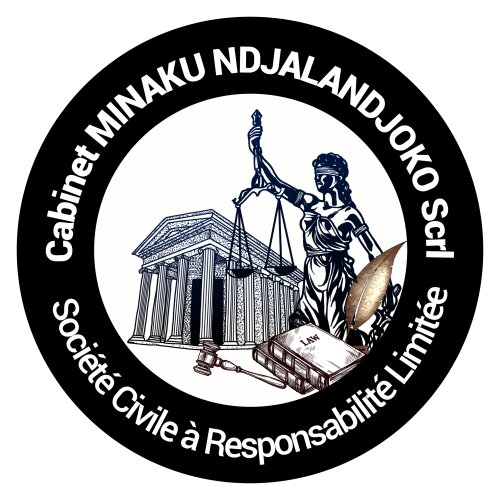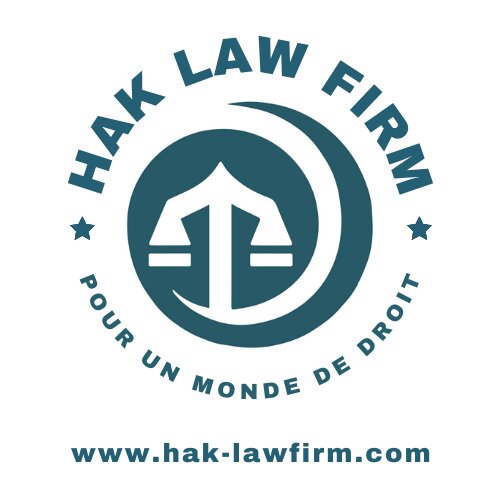Best Employer Lawyers in Kinshasa
Share your needs with us, get contacted by law firms.
Free. Takes 2 min.
List of the best lawyers in Kinshasa, DR Congo
About Employer Law in Kinshasa, DR Congo
Employer law in Kinshasa, Democratic Republic of the Congo, encompasses a wide range of legal statutes and regulations that govern the relationship between employers and employees. This includes areas such as employment contracts, wages, working hours, workplace safety, and employee rights. The legal framework is designed to ensure fair treatment, prevent discrimination, and promote a productive work environment. Companies operating in Kinshasa must navigate both local and national labor laws, making compliance a critical component of business operations.
Why You May Need a Lawyer
There are several common scenarios where seeking legal assistance from a lawyer specializing in employment law might be beneficial:
- Contract Disputes: If there are disagreements regarding employment contracts, such as terms, conditions, or any breaches.
- Wrongful Termination: Assistance in cases where an employee believes they have been unfairly dismissed.
- Workplace Discrimination: Navigating cases involving discrimination based on race, gender, disability, or other protected characteristics.
- Wage and Hour Claims: Resolving issues related to unpaid wages, overtime disputes, or incorrect salary payments.
- Workplace Harassment: Legal intervention in instances of bullying or sexual harassment at the workplace.
- Health and Safety Violations: Addressing cases where employers fail to provide a safe working environment.
- Collective Bargaining and Union Issues: Legal guidance in matters involving collective bargaining agreements or disputes between unions and employers.
Local Laws Overview
The legal structure in Kinshasa is deeply influenced by both local decrees and national labor codes. Key aspects include:
- Employment Contracts: Mandatory written contracts that clearly outline job roles, responsibilities, and remuneration.
- Minimum Wage: Regulations stipulating the minimum wage standards that employers must adhere to.
- Working Hours: Limitations on the number of hours an employee can work each week, including overtime regulations.
- Leave Entitlements: Rules governing annual leave, sick leave, and maternity/paternity leave.
- Social Security: Obligations for employers to contribute to a social security system for the welfare of employees.
- Termination Procedures: Legal processes that must be followed to terminate an employee, including notice periods and severance pay.
- Health and Safety Regulations: Laws requiring employers to maintain safe and healthy work conditions.
Frequently Asked Questions
What are the basic requirements for an employment contract in Kinshasa?
Employment contracts in Kinshasa must be in writing and include essential details such as job title, salary, working hours, and duration of employment.
Can an employer terminate an employee without notice?
No, employers must follow legal procedures for termination, which typically include providing notices and valid reasons for the dismissal.
What is the minimum wage in Kinshasa?
The minimum wage in Kinshasa is subject to government regulations and updates, which stipulate the lowest remuneration employers are legally allowed to pay.
How are disputes over unpaid wages resolved?
Disputes over unpaid wages can be resolved through legal action, often beginning with mediation or intervention through a labor inspectorate.
What constitutes workplace discrimination?
Workplace discrimination involves unfair treatment based on attributes such as race, gender, age, religion, or disability, which is illegal under Congolese law.
How can an employee report unsafe working conditions?
Employees can report unsafe working conditions to relevant authorities, such as labor inspectors or health and safety officers, who can investigate and enforce compliance.
Are there specific laws protecting against sexual harassment?
Yes, there are laws prohibiting sexual harassment in the workplace, ensuring that employees have the right to a work environment free from harassment.
Is it mandatory for employers to contribute to social security for employees?
Yes, it is mandatory for employers to contribute to social security, which supports employees in times of health issues, unemployment, or retirement.
What rights do employees have in collective bargaining?
Employees have the right to form and join trade unions and participate in collective bargaining to negotiate better working conditions and terms of employment.
How is workers' compensation handled in case of injury?
Workers' compensation is managed through insurance or social security schemes, providing benefits to employees who suffer work-related injuries or illnesses.
Additional Resources
Here are some resources and organizations that can provide further assistance and information:
- The Ministry of Labor, Employment, and Social Welfare: The primary governmental body responsible for labor laws.
- The Bar Association of Kinshasa: Offers directories of qualified employment lawyers.
- Local Labor Unions: Can provide support and advice on collective bargaining and workers' rights.
- Non-Governmental Organizations (NGOs): Such as those focused on labor rights and employment conditions.
Next Steps
If you require legal assistance regarding employment issues, consider the following steps:
- Identify your specific legal needs and gather relevant documents related to your case.
- Consult with a qualified employment lawyer to review your situation.
- Contact the appropriate governmental agency or labor office for advice or to file a complaint.
- Consider mediation or arbitration for dispute resolution before resorting to court action.
- Stay informed about your rights and responsibilities under current employment laws to prevent future issues.
Lawzana helps you find the best lawyers and law firms in Kinshasa through a curated and pre-screened list of qualified legal professionals. Our platform offers rankings and detailed profiles of attorneys and law firms, allowing you to compare based on practice areas, including Employer, experience, and client feedback.
Each profile includes a description of the firm's areas of practice, client reviews, team members and partners, year of establishment, spoken languages, office locations, contact information, social media presence, and any published articles or resources. Most firms on our platform speak English and are experienced in both local and international legal matters.
Get a quote from top-rated law firms in Kinshasa, DR Congo — quickly, securely, and without unnecessary hassle.
Disclaimer:
The information provided on this page is for general informational purposes only and does not constitute legal advice. While we strive to ensure the accuracy and relevance of the content, legal information may change over time, and interpretations of the law can vary. You should always consult with a qualified legal professional for advice specific to your situation.
We disclaim all liability for actions taken or not taken based on the content of this page. If you believe any information is incorrect or outdated, please contact us, and we will review and update it where appropriate.
















